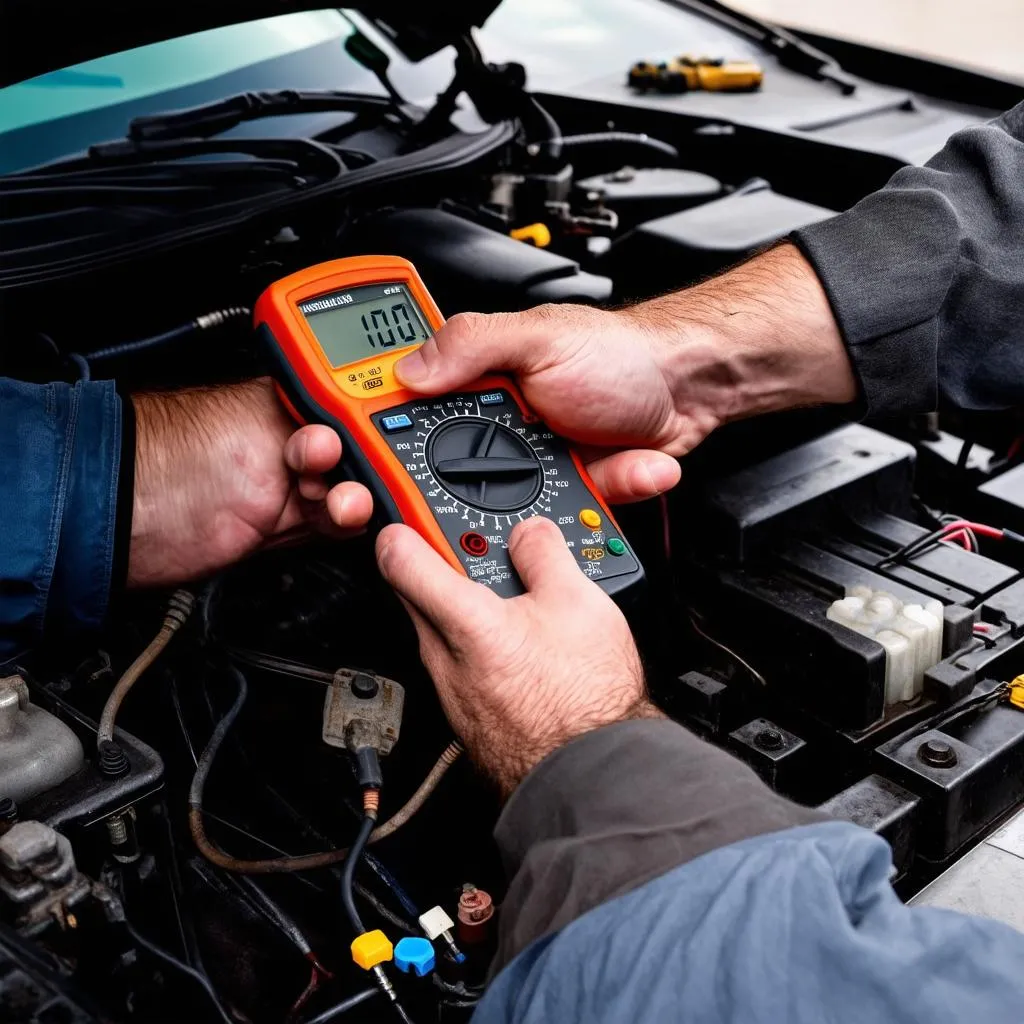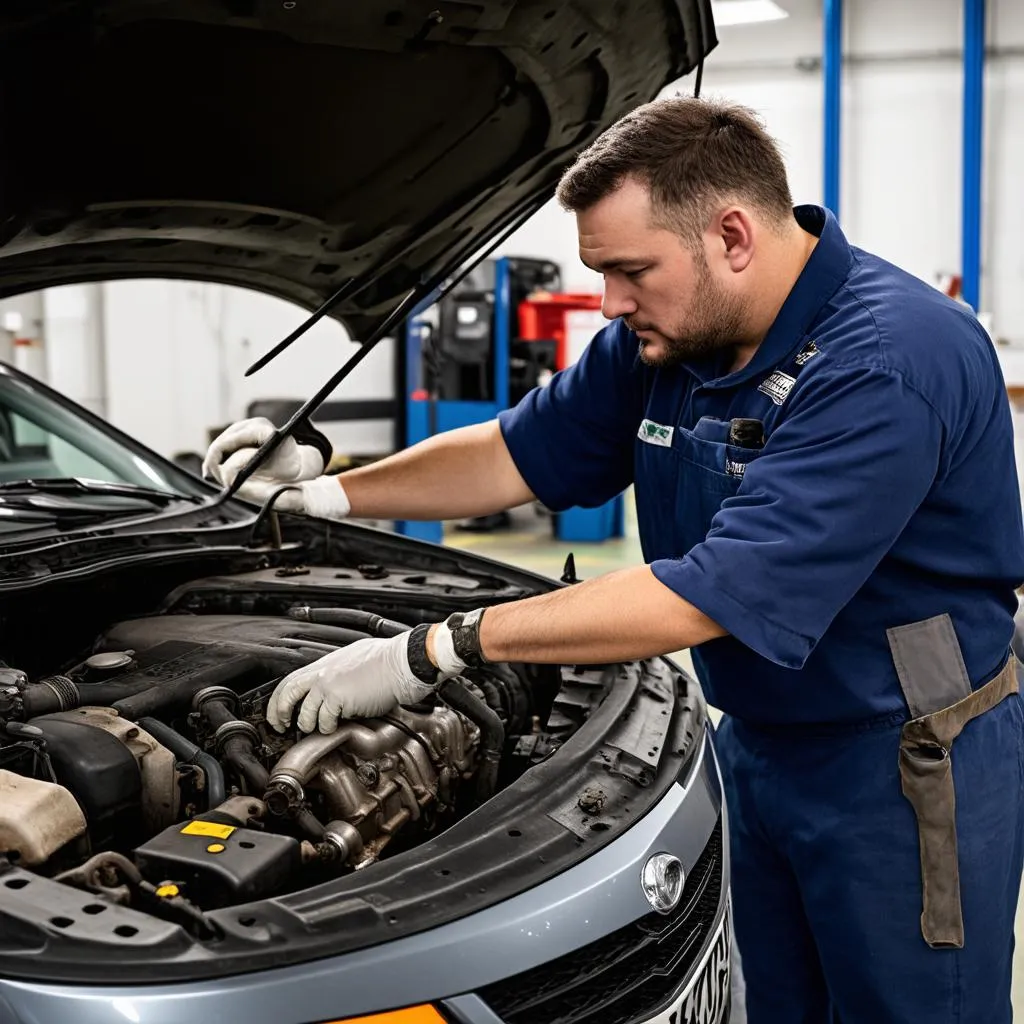“A smooth sea never made a skilled sailor,” and similarly, a car that never throws an engine code probably hasn’t seen much action. But for the rest of us, dealing with those pesky dashboard lights is a part of life. One such light, often accompanied by the ominous “Check Engine” warning, can point to the OBD code P0190. Sounds scary, right? Don’t worry; let’s demystify this code and set you on the road to resolution.
What Does OBD Code P0190 Mean?
The code P0190 specifically refers to a “Fuel Rail Pressure Sensor Circuit Malfunction.” In simpler terms, your car’s engine computer, the ECM (Engine Control Module), isn’t getting accurate readings from the sensor that monitors the pressure of the fuel being delivered to the engine.
Think of it like this: imagine trying to bake a cake without being able to accurately measure the flour. Your cake might turn out too dense, too crumbly, or just plain wrong. Similarly, your engine needs the correct fuel pressure for optimal performance.
This code doesn’t tell you why the signal is faulty, just that it is. It could be a problem with the sensor itself, the wiring, or even a problem with the fuel pump or fuel system.
Symptoms of a P0190 Code
Now, you might be thinking, “Okay, but how do I know if my car has this problem?” Here are some telltale signs that your car might be struggling with a P0190 code:
- Illuminated Check Engine Light: This one’s a no-brainer. The check engine light is your car’s way of saying, “Hey, something’s not right here!”
- Rough Idling: Your car’s engine might sound rough or shaky when it’s idling, like a washing machine on spin cycle.
- Hesitation or Stalling: You step on the gas pedal, expecting smooth acceleration, but your car hesitates or, worse, stalls.
- Reduced Fuel Economy: Noticing you’re making more frequent trips to the gas station? A P0190 code can disrupt fuel efficiency.
- Increased Emissions: This one might not be as noticeable, but a malfunctioning fuel system can lead to increased emissions, which isn’t good for the environment or your car’s performance.
Common Causes of OBD Code P0190
Let’s delve into the reasons behind this troublesome code:
- Faulty Fuel Rail Pressure Sensor: Like any sensor, the fuel rail pressure sensor can wear out over time, leading to inaccurate readings.
- Wiring Issues: Exposed, corroded, or damaged wires in the sensor circuit can disrupt the flow of information to the ECM.
- Fuel Pump Problems: A failing fuel pump might not be able to provide adequate fuel pressure, triggering the code.
- Clogged Fuel Filter: Think of your car’s fuel filter as the guardian of your engine. A clogged filter restricts fuel flow, impacting pressure and potentially leading to a P0190 code.
- Fuel Injector Malfunction: While less common, a malfunctioning fuel injector can also contribute to fuel pressure issues.
Diagnosing and Fixing the P0190 Code
Now, before you grab your toolbox and start taking things apart, remember: diagnosing car problems requires a systematic approach.
- Read the Code: Start by using an OBD-II scanner to confirm the P0190 code.
- Inspect the Sensor: Visually inspect the fuel rail pressure sensor and its wiring for any obvious damage.
- Check Fuel Pressure: Use a fuel pressure gauge to verify if the fuel pressure is within the manufacturer’s specifications.
- Test the Sensor: If you suspect a faulty sensor, test it using a multimeter to ensure it’s sending the correct signals.
- Inspect Wiring and Connections: Thoroughly check the wiring harness for any loose connections, corrosion, or damage.
 Car Engine Diagnostic
Car Engine Diagnostic
Can I Drive with a P0190 Code?
While technically you might be able to drive for a short distance with a P0190 code, it’s not recommended. Driving with a faulty fuel system can lead to further damage and potentially leave you stranded.
A Word on Feng Shui and Car Trouble
Some people believe that car troubles can be a sign of negative energy or blockages in one’s life. While there’s no scientific evidence to support this, maintaining a positive mindset and taking proactive steps to address car issues can certainly bring peace of mind.
Looking for More Car Repair Insights?
If you’re interested in learning more about other OBD codes, check out our article on OBD code P0191. It covers a closely related issue that might provide further insights into your car troubles.
Need Help? We’re Just a Message Away!
We understand that car repair can be daunting. If you need assistance diagnosing or fixing your car’s P0190 code, don’t hesitate to reach out to our team of auto experts on Whatsapp at +84767531508. We’re available 24/7 to provide support and guidance.
 Car Mechanic Repairing
Car Mechanic Repairing
Remember, a little knowledge and proactive maintenance can go a long way in keeping your car running smoothly and safely.
